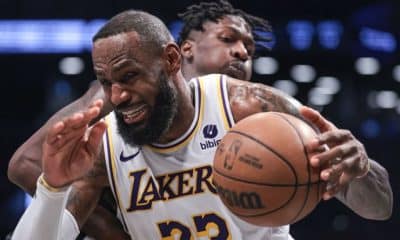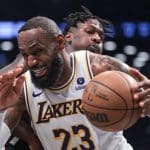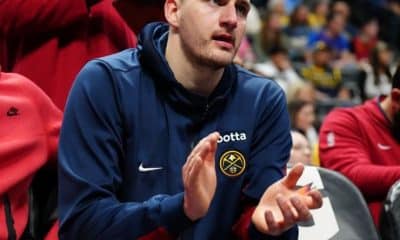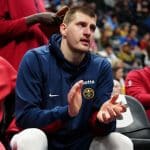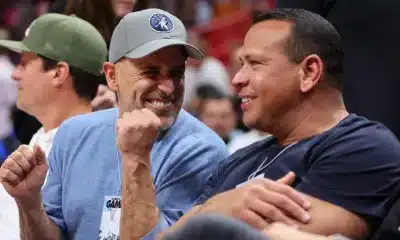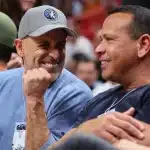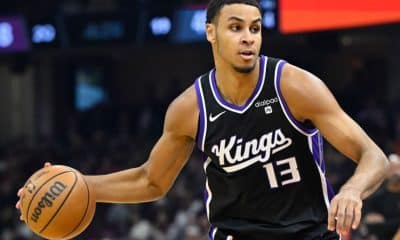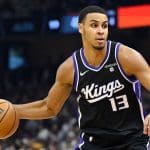NBA
Looking At The NBA Draft: The No. 4 Picks
Drew Maresca continues Basketball Insiders’ “Looking Back” series, analyzing all of the fourth overall picks since 2009.
We at Basketball Insiders are torn over the COVID-19 pandemic and basketball: We badly want to get back to at least watching games – if not attending them – but fully understand the need to do so as safely as possible for the sake of the players, coaches, league and team personnel, fans and us – the media.
Considering that there are no concrete updates pertaining to re-starting the 2019-20 regular season, we will continue to analyze what we know by taking a look back at various facets of the game.
Today, let’s continue gauging each pick in the past 10 NBA Drafts, turning our attention to the fourth overall pick.
The fourth pick in the NBA Draft seems to carry its share of challenges. Considering the talent taken after the fourth pick, the lack of All-Stars coming from this spot is pretty shocking. Granted, teams typically miss on the headliners of a given draft at four, but there has been real talent available after the top three picks in each of the last 10 drafts. How did each fourth pick perform? Let’s look back through 2009 to decide.
Hits
Kristaps Porzingis – New York Knicks – 2015
Sorry in advance Knicks fans, but Porzingis is probably the best and more appropriate selection of all of the fourth overall picks taken in the last 10 years. He entered the draft as 2015’s mystery man. Outside of international scouts, all we knew about him came from EuroLeague highlights and a workout tape. But that was enough. In said footage, we saw a 7-foot-3 center who could shoot it like a guard, as well as run and leap like a wing. The lanky Latvian won over many prior to draft night – and the rest shortly after.
Porzingis averaged an impressive 14.3 points, 7.3 rebounds, and 1.9 blocks per game while shooting 33.3 percent on three-point attempts as a rookie. Fast forward to the 2019-20 season and he averaged an impressive 19.2 points, 9.5 rebounds and 2.1 blocks on 34.9 percent shooting from deep. And remember, Porzingis was still working his way back to form following a major knee injury suffered in the 2017-18 season – which he’d seemingly done successfully, having averaged 24.4 points, 10.8 rebounds and 2.4 blocks per game with 36.7 percent shooting from three in the most recent two-month stretch (14 games in February and March).
Porzingis is about as good as it gets with the fourth overall pick. He should inspire hope for the Timberwolves, who will pick fourth if the NBA chooses to skip the Draft Lottery.
Jaren Jackson Jr. – Memphis Grizzlies – 2019
Jackson Jr. appeared as safe a pick as possible. He’s big, stretches the floor, defends multiple positions and seems to be a genuinely nice guy. But teams have been fooled by all of those attributes before.
Only Jackson Jr. has been everything the Grizzlies hoped he’d be – and more. He was fifth overall in scoring per game amongst rookies (14.8 ppg). He was also second in blocks, and he shot 35.9 percent on three-point attempts. And that was before he paired up with rookie phenom Ja Morant.
Alongside Morant, Jackson Jr. averaged 16.9 points and 1.6 blocks per game, and he shot 39.7 percent on three-point attempts. He’ll have to improve his rebounding, but Jackson Jr. looks like a star in the making. He and Morant should be among the best one-two punches in the NBA for years to come.
Misses
Tyreke Evans – Sacramento Kings – 2009
Evans was perceived far differently just a few short years ago. He looked the part of a borderline star early on in his career, and he even secured the NBA Rookie of the Year award in 2009-10. And while he’s never been able to re-capture the magic he produced in his rookie season – Evans is one of five rookies in NBA history to average 20-5-5 (Oscar Robertson, Michael Jordan, LeBron James and Luka Doncic) – he still put forth a number of successful seasons, including averaging 15-plus points per game seven times.
So why is Evans headlining the misses section of this article? Namely, because he got himself suspended for two years in the spring of 2019 for violating the league’s drug policy. And while he’s put up nice numbers: he only made it to the playoffs twice, went right before Stephen Curry (No. 7) and DeMar DeRozan (9), while Jrue Holiday (17) and Ricky Rubio (5) also had better careers.
So while Evans looked like a hit in the making, his inability to develop on his phenomenal rookie season along with his poor decision-making render him the most disappointing miss.
Dion Waiters – Cleveland Cavaliers – 2012
Waiters was selected in a weird draft – one in which we saw probably the biggest bust of the decade in Anthony Bennett taken first overall. The selection of Waiters wasn’t initially seen as unfavorable – he averaged 12.6 points and shot better than 36 percent from long range during his sophomore season at Syracuse.
But the problem with the Waiters choice is his lack of development in the NBA. He averaged essentially as many points per game in his rookie season (14.7) as he did in the fifth year – which was his most successful at 15.8. And he never really committed himself to getting or staying in shape.
This season has been especially rocky for Waiters. He averaged a career-low 9.6 points per game – only the second time in his eight-year career he’s scored less than 10. And that doesn’t get into his three suspensions (for failure to adhere to team policies, violation of team rules, continued insubordination, unprofessional conduct and allegedly ingesting a marijuana edible prior to boarding a team plane) either.
To make matters worse, Waiters was selected ahead of Damian Lillard. He’s been inconsistent at best and teams expect more from a fourth overall pick than what any of his three employers received.
Dragan Bender – Phoenix Suns – 2016
Bender was unfairly compared to Porzingis in the pre-draft analysis based entirely on the fact that they were both skilled European bigs. The comparison wasn’t fair to Bender, who struggled to secure minutes in his rookie season. He averaged just 3.4 points over 13.3 minutes per game. And his production hasn’t really picked up.
There is a functional glimmer of hope – Bender played his best basketball with Golden State to close the 2019-20 season by averaging 9 points, 5.9 rebounds and 2.1 assists in 21.7 minutes per game. But function and expectations are usually not aligned, and Bender hasn’t come close to living up to the hype associated with the fourth pick in the NBA Draft.
And what’s more, lots of athletes selected after Bender have prospered: Buddy Hield (No. 6), Jamal Murray (7), Domantas Sabonis (11), Caris LeVert (20), Pascal Siakam (27) and Dejounte Murray (29). Granted, there is typically a consensus of players that’ll go as high as Bender did, but, needless to say, the Suns would have been thrilled with any of those other options. He’s a 7-foot small forward, so teams will continue being intrigued by him – but he hasn’t done enough to be classified as anything but a miss.
Josh Jackson – Phoenix Suns – 2017
Nevermind the players who Jackson was taken before – a number of whom possess far more potential than does Jackson after just two seasons. But the selection of Jackson is a bad miss because his negative attributes might have been identified if the Suns were more critical.
Jackson was seen as a versatile prospect. He put up 16.3 points and 7.4 rebounds per game while establishing a reputation as a hard-nosed defender. But he did not come without his share of baggage. The 6-foot-8 forward was suspended by Kansas head coach Bill Self for “duty upon striking an unattended vehicle, inattentive driving and improper backing” on campus in 2017. He was also charged with criminal property damage in 2016.
The Suns have a poor draft history in recent years, botching multiple selections (see: Dragon Bender). This seems to be a top-down, organizational issue, described in this 2019 ESPN article.
Jackson’s critics have been vindicated since draft night, three years ago. The youngster has been arrested at least twice since that occasion – once for felony escape and resisting arrest and another for allowing his child to become intoxicated. He’s also been fined $35,000 by the NBA for making a “menacing gesture” and again by the Suns for missing an autograph appearance.
Despite posting decent stats –13.1 points, 4.6 rebounds, 1.5 assists, 1.0 steals and .5 blocks per game as a rookie – Jackson was dealt to Memphis as part of a deal that returned Kyle Korver and Jevon Carter. Phoenix was clearly just fed up with Jackson’s behavior.
He’s since turned his career around to some degree, staying out of trouble and establishing himself as an effective weapon in the G-League – so much so, that he was recalled to the Grizzlies on January 29 for the final 18 games played in 2019-20.
Still, Jackson’s among the most disappointing fourth picks in recent memory – mostly because his issue has been more about maturity than talent.
Middle Of The Road
Aaron Gordon – Orlando Magic – 2012
Aaron Gordon is a strange case. He was definitely viewed as the best remaining player at No. 4. And he’s mostly lived up to the billing. He’s arguably the best player taken in the entire draft not named Joel Embiid or Nikola Jokic – and, of course, the latter was drafted in the second and wasn’t getting serious first-round consideration.
If he had he taken another step forward in 2019-20, Gordon may have made the hits list. Instead, his output took a hit as his scoring average dropped to 14.4 points per game, with his three-point and overall field goal percentages falling along with it.
But he’s still viewed positively around the league as both a versatile defender and a unique offensive talent who can bang down low and help initiate the offense. He’s probably due for a change of scenery, but he’s still viewed as a unique talent with untapped upside.
De’Andre Hunter – Atlanta Hawks – 2019
Hunter is the most recent fourth overall pick, so it’s tough to impart too much judgment. He came in with relatively high expectations, with the Hawks sending the eighth, 17th and 35th overall picks to the Pelicans (via the Lakers) for the rights to Hunter. All of those picks turned into Jaxson Hayes, Nickeil Alexander-Walker and Didi Louzada (did not play in NBA in 2019-20).
While Hunter’s 3-and-D skill set was badly needed by Atlanta, this writer can’t help but think that he might have been better served to land on a team with fewer wings. He’ll never maximize his potential in Atlanta splitting time with Cam Reddish and Kevin Huerter.
But he didn’t even get to finish his rookie year due to a now-shortened NBA season. In 63 games, he averaged a respectable12.3 points, 4.5 rebounds and 1.8 assists, posting a below-average PER (8.6). Hunter’s biggest let down was probably his three-ball; he shot 41.9 percent on 2.8 attempts during his sophomore season at Virginia, compared to the 35.5 percent on 2.7 attempts with the Hawks.
Hunter’s story is still mostly unwritten. He seems to have the right attitude and skillset to succeed – but he’ll probably struggle to gain any real traction in the near future. It’s unlikely that he’ll go down as a miss, but his path to a hit is a tough one, too.
The Role Players
Wesley Johnson – Minnesota Timberwolves – 2010
Johnson is best known for getting crossed out of his shoes by James Harden. But he was selected over DeMarcus Cousins, Gordon Hayward and Paul George. He was also taken ahead of Eric Bledsoe, Al-Farouq Aminu and Avery Bradley. A recent Bleacher Report article that re-drafted the 2010 NBA Draft slotted Johnson at No. 19 overall.
Prior to leaving the NBA for the EuroLeague in 2019, Johnson was good for 7.0 points, 3.2 rebounds and 2.6 assists per game. He never broached the 30 minute per game mark across an entire season, and he never cemented himself as a full-time starter. Calling Johnson a role player might seem a tad generous, but he played a consistent role for four of his six teams – which can’t be said for all of the guys on this list.
Tristan Thompson – Cleveland Cavaliers – 2011
Thompson is the hardest fourth pick to classify. By some measures, he’s a hit – e.g., he averaged a double-double in each of the last two seasons. By others, he’s… less of one as he failed to break double-digit points per game in five of his nine NBA seasons, four of which were played alongside LeBron James.
Ultimately, he’s probably an upper-echelon role player. He’s been around for long enough to know what you’ll get from him. He’ll work his butt off rebounding the ball and defending. But he’s not a versatile enough defender to stay with faster stretch-fours (e.g., Jayson Tatum), and his shooting – while adequate – leaves something to be desired.
What makes this pick truly hard to classify is the fact that the Cavaliers passed on Klay Thomson, Kemba Walker and Kawhi Leonard to select Thompson – but he was also an integral part of the franchise’s first NBA championship.
Maybe he belongs in multiple categories.
Cody Zeller – Charlotte Hornets – 2013
No one saw Zeller as a franchise-saver. Still, he probably could’ve been more successful had he been drafted into a better-run organization. Instead, he was selected by Charlotte, who really only had a young Kemba Walker to build around. They needed a savior. Instead, they got a role player.
Zeller was – and remains – an athletic big man who can run the floor extremely well. He registered career highs in point (11.1) and rebounds (7.1) in 2019-20 – so it’s great that he’s still getting better. But after seven seasons in the league, we probably can’t expect much more. Further, the 2013 NBA Draft saw the Hornets pass on CJ McCollum, Steven Adams, Giannis Antetokounmpo and Dennis Schroder – so it’d be really hard to pass Zeller off as a hit. But he is still playing for Charlotte, so at least there’s that.
To say that the NBA Draft is an inexact science is a huge understatement. Some franchise cornerstones never pan out, while unknown prospects become stars. The fourth pick clearly presents its own unique challenges, mixing pressure with fewer prospects. Ultimately, teams understand the risks associated with picking so high. But there is still no way of guaranteeing a successful pick – it’s what makes the NBA Draft the event that it is.
Add Basketball Insiders to your Google News Feed!
-
Main Page 1 week ago
LeBron James joins Michael Jordan as only NBA players with multiple 40-point games after turning 39
-
Main Page 1 week ago
Nikola Jokic 1st NBA player since Oscar Robertson with 26+ points, 18+ rebounds, & 16+ assists in a game
-
NBA 1 week ago
Ex-MLB star Alex Rodriguez vows to keep trying to buy Timberwolves franchise despite rejection
-
Main Page 1 week ago
Kings are 14-5 this season when Keegan Murray scores 19+ points
